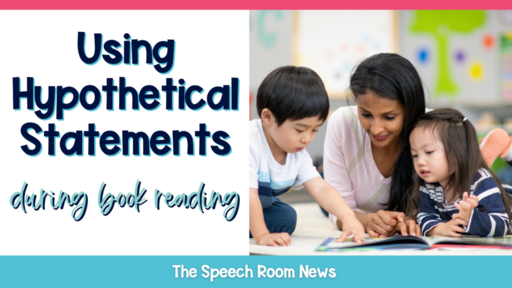Have you heard of using hypothetical statements during book reading? Lately, there has been a lot of research on this topic and I wanted to share the EBP with you today!
Why Should you Add Hypothetical Statements during Shared Book Reading? Let’s look at the Research:
According to the research you should try incorporating hypothetical statements into your group reading activities. During shared book reading, Lohse et al. discovered that when an adult used a hypothetical statement (e.g., maybe it’s the…) rather than an instructive statement (e.g., this is the…), children’s responses were longer and contained more self-generated explanations.
According to the authors, adult expressions of uncertainty encourage children to speculate about alternative explanations and place greater emphasis on their own ideas. This, in turn, could spark a lovely, language-rich discussion that would not have occurred with a simple instructive statement.
I found this great EBP using The Informed SLP. I’m not paid to advertise for them. I’m just a happy paying customer who wanted you to know where I first heard about this research!
Experiments about Hypothesis Statements
In turn, adult-child interactions can help children develop and have been shown to predict program quality in early childhood settings. However, the linguistic components that comprise positive interactions have yet to be thoroughly studied. This study looks at how adults’ hypotheses affect children’s responses in a dyadic picture-book viewing situation.
In two experiments, adults were tested on their use of hypotheses (e.g., “Maybe this is a dwarf’s door”) versus instructive statements (“This is a dwarf’s door”) and open questions (“What do you think, why is the door so small?”). Only the modal marker “maybe” distinguished hypotheses from instructions in Experiment 1. When compared to responses to instructions, children’s responses to hypotheses were longer and contained more self-generated explanations.
The use of hypotheses also seemed to encourage children to value their own explanations more. Combining hypotheses with open-ended why questions elicited longer responses but no more self-generated explanations in children than open-ended questions alone did in Experiment 2.
What is the Lesson of these Experiments?
The findings show that subtle differences in adults’ utterances can have a direct impact on children’s reasoning and contributions to dialogues. So, in simple terms, ask open-ended or hypothesis style questions instead of intrusive statements.
Here are the main take aways:
- Adult hypotheses elicit longer verbal responses and more self-generated hypotheses in children than instructive explanations.
- When children generate hypotheses in response to adult hypotheses rather than instructions, they appear to evaluate them differently.
- Using open questions and hypotheses together promotes children’s speech production but not their generation of their own hypotheses.
- A micro-analytic experimental approach is used to investigate linguistic elements of adult-child interactions.
How will you incorporate this research into Speech Therapy?
Use open-ended questions and hypothesis statements in speech. This is great information to share with educators that you work with who may be doing more shared whole group reading. Apply this strategy in your therapy room using book companions during group reading.
For example, in the book companion: If You Give a Mouse a Cookie, students will write or draw about what the mouse might need. You are not telling them what the mouse needs but putting the language in hypothetical terms for students.
Citation:
Join the SRN newsletter!

I'm so glad you stopped by! If you'd like to keep up with the newest posts and get exclusive free downloads, please sign up for the newsletter! Your first freebie is ready as soon as you subscribe and confirm your email!




Leave a Reply